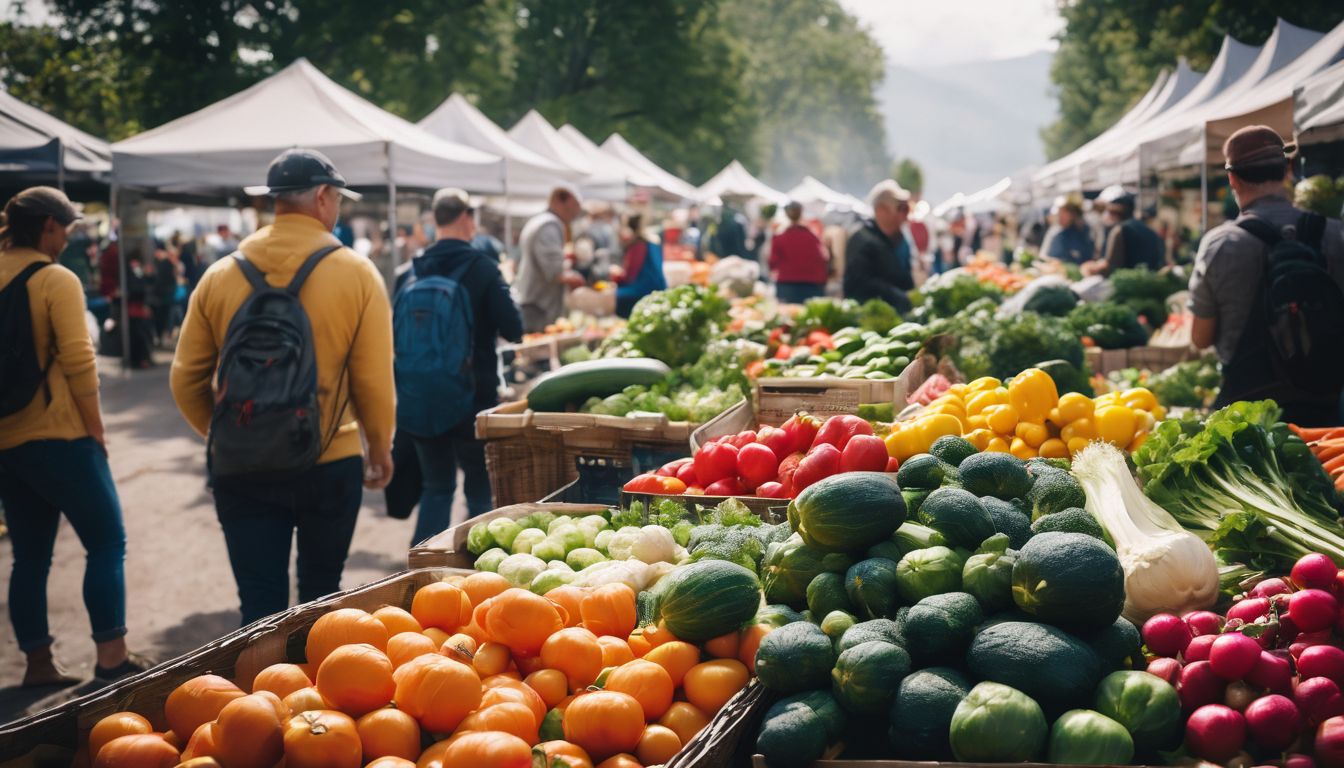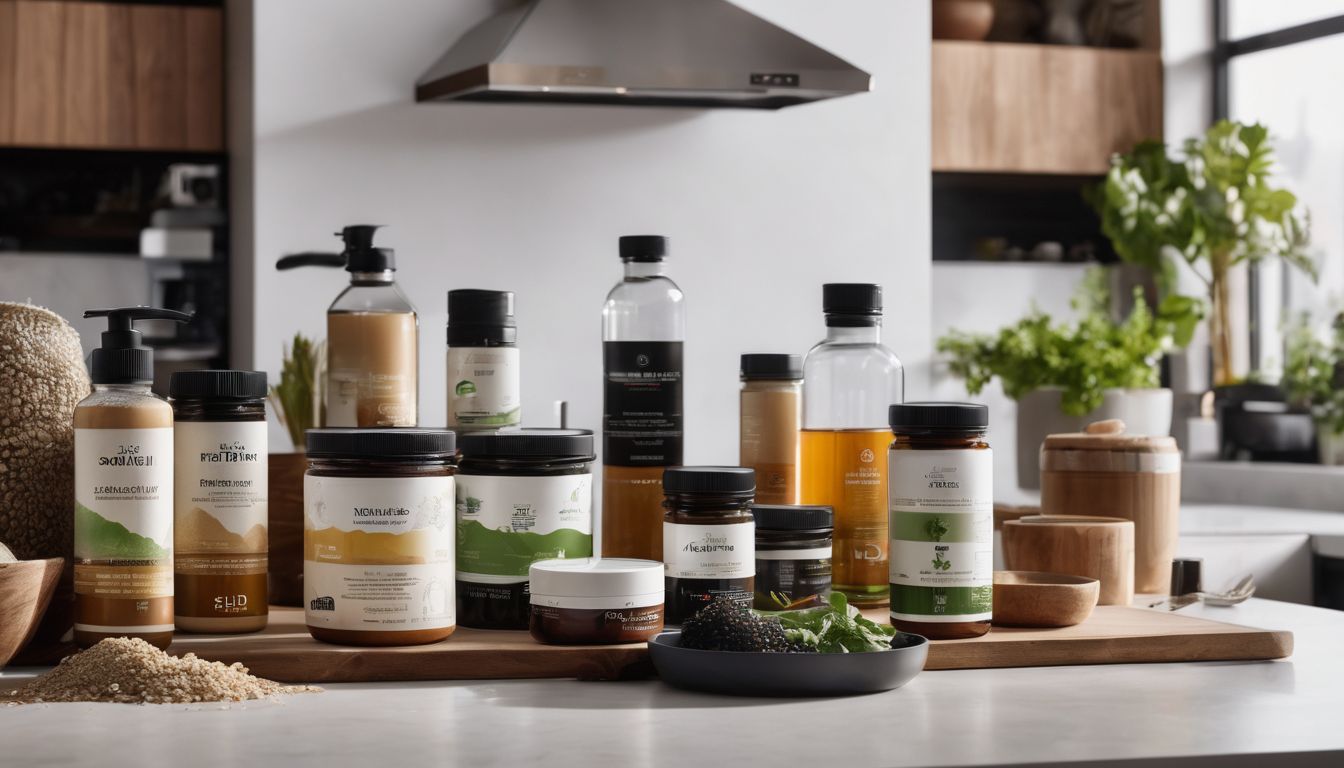Like so many of us, the sight of our once-pristine landscapes cluttered with single-use plastics has become a source of profound unease. The images of pollution-strewn environments are not just unsettling; they’re a clarion call for change.
Delving into research, one fact struck us with particular force: an estimated 8 million tonnes of plastic waste make their way into our oceans each year.
Taking this to heart, we’ve been inspired to explore how turning away from plastic can yield tremendous benefits – not only for the natural world but also for us as individuals and communities.
Our forthcoming article insightfully examines the ripple effect that even seemingly modest adjustments in our daily lives can have. Join us as we navigate through these changes together and uncover the powerful impact that comes from taking care in the choices we make.
Key Takeaways
- Turning to plastic – free alternatives helps cut down on greenhouse gas emissions from the production and breakdown of plastics, effectively battling climate change.
- Eco-friendly products like glass, metal, and biodegradable materials can replace single-use plastics, resulting in less waste clogging up landfills and oceans.
- Wildlife benefits when we reduce plastic use; this prevents animals from ingesting or getting tangled in plastic waste, which can be deadly.
- Choosing zero – waste and sustainable options not only safeguards the environment but also promotes healthier living by reducing exposure to harmful chemicals found in some plastics.
- Supporting local businesses that produce eco – friendly goods boosts the economy while fostering community growth committed to environmental responsibility.
The Problem with Plastics
Plastics are contributing to greenhouse gas emissions and generating waste, harming the environment and wildlife. It’s time to address these issues for a healthier planet.
Contributing to greenhouse gas emissions
We often overlook the role plastics play in escalating our carbon footprint. From production to disposal, plastic items emit significant amounts of greenhouse gases. These emissions contribute to climate change and affect our planet’s health.
During manufacturing, raw materials are processed using energy-intensive methods that release carbon dioxide into the atmosphere. Transporting these products adds another layer of emissions.
Even when we throw them away, plastics continue harming the environment. They slowly breakdown in landfills, releasing methane—a potent greenhouse gas—into the air we breathe. By choosing ecofriendly alternatives and supporting sustainable packaging initiatives, we actively reduce this harmful cycle of pollution and take a step toward green living.
The journey towards environmental protection continues as we explore how plastic generates waste with far-reaching consequences.
Generating waste
Plastic products generate a staggering amount of waste every year. This waste ends up in landfills and oceans, contributing to environmental degradation and harming wildlife. Our reliance on single-use plastics has led to a significant increase in plastic pollution, with detrimental effects on ecosystems and biodiversity.
The accumulation of plastic waste poses a severe threat to the health of our planet, necessitating urgent action towards reducing our dependence on disposable plastics.
Embracing sustainable alternatives is crucial for mitigating the impact of generating waste from plastic products. By adopting reusable and biodegradable materials, individuals can significantly reduce their contribution to the global waste crisis while safeguarding the environment for future generations.
Harming the environment
Plastic pollution harms the environment in various ways. It pollutes our land and water, endangers wildlife, and threatens ecosystems. Marine animals often mistake plastic for food, leading to ingestion and entanglement which can be fatal.
Furthermore, the production of plastics contributes to greenhouse gas emissions, worsening climate change.
Plastics also take hundreds of years to decompose, clogging up landfills and leaching harmful chemicals into the soil. This not only affects the natural balance but also poses a risk to human health as these toxins can seep into our food and water sources.
Impact on wildlife and oceans
Plastic pollution affects wildlife and marine life, leading to entanglement, ingestion, and habitat destruction. Marine animals often mistake plastic for food, resulting in blockages in their digestive systems or starvation.
This poses a serious threat to the delicate balance of ocean ecosystems and endangers numerous species. Furthermore, plastics can release toxic chemicals into the water that are harmful to marine life, including fish and corals.
As environmentally conscious individuals supporting conservation efforts, we must actively address plastic pollution to protect the biodiversity of our oceans.
Furthermore, plastic waste is increasingly impacting coastal areas where many wildlife species reside. The accumulation of plastic debris on shorelines can disrupt nesting habitats for birds and sea turtles while also posing entanglement risks for various terrestrial animals.
Additionally, plastics degrade very slowly in saltwater environments, further exacerbating the issue by persisting for decades and continually threatening vulnerable marine ecosystems.
Benefits of Going Plastic-Free
By adopting a plastic-free lifestyle, we can protect the environment, reduce waste, improve our health and support local economies. Read on to discover more about the positive impact of going plastic-free.
Environmental protection
Environmental protection is crucial in minimising the negative impact of plastic on our planet. Choosing eco-friendly products and packaging, supporting recycling initiatives, and reducing waste are effective ways to protect the environment.
These actions contribute to waste management, ocean conservation, and carbon footprint reduction. By making sustainable choices, we can actively participate in preserving biodiversity and promoting green living.
Embracing a zero-waste lifestyle ensures that we take responsibility for the future of our planet while supporting sustainable practices for current and future generations.
Reduced waste
Choosing plastic-free products helps reduce waste and minimises the environmental impact of single-use plastics. By opting for reusable containers, eco-friendly packaging, and sustainable alternatives, we can decrease the amount of non-biodegradable waste ending up in landfills and oceans.
This change promotes sustainable waste management practices, contributing to a cleaner environment and healthier ecosystems. Embracing a zero-waste lifestyle is crucial in our efforts to conserve natural resources and protect wildlife.
Transitioning towards plastic-free living also fosters a greater awareness about consumption habits and their repercussions on the planet. It empowers individuals to make mindful choices that align with eco-friendly values while inspiring others to do the same.
Health benefits
Choosing plastic-free products can lead to numerous health benefits. By reducing exposure to potentially harmful chemicals commonly found in plastics, such as BPA and phthalates, individuals can lower the risk of various health issues, including hormone disruption and certain cancers.
Opting for eco-friendly and sustainable products also reduces the consumption of single-use plastics that have been linked to health problems like respiratory issues and allergies.
Additionally, embracing a plastic-free lifestyle encourages healthier habits by promoting the use of natural materials which are free from toxins and contribute positively to overall well-being.
Economic benefits
Switching to plastic-free products can also provide economic benefits. By opting for sustainable and eco-friendly alternatives, we support local businesses that prioritise environmental responsibility.
This not only boosts the economy but also encourages the growth of green industries. Additionally, reducing reliance on single-use plastics can lead to cost savings for individuals, lessening their expenditure on disposable items and encouraging long-term financial sustainability.
Moving forward, it’s important to consider how our choices impact both the environment and our wallets. The next section delves into strategies for adopting a plastic-free lifestyle in practical ways.
Increased awareness
We encourage everyone to stay informed about the impact of plastic on the environment. That way, individuals can make more conscious choices in their daily lives, support eco-friendly initiatives, and advocate for sustainable practices.
By increasing awareness, we empower ourselves to drive positive change for our planet and future generations.
Raising awareness is essential for promoting a greener lifestyle and reducing our reliance on single-use plastics. It’s important to share knowledge about the benefits of using plastic-free products with others in our community.
Ways to Adopt a Plastic-Free Lifestyle
Shopping at zero-waste stores, supporting local communities, and using alternative packaging materials are all effective ways to transition to a plastic-free lifestyle. To find out more about the impact of plastic-free products on the environment, keep reading!
Using alternative packaging materials
Choosing products with alternative packaging materials like glass, metal, or biodegradable materials can significantly reduce the amount of plastic waste generated. These materials are more sustainable and can be reused or recycled, contributing to a healthier environment.
- Glass: Glass containers are an excellent alternative to plastic packaging. They are reusable, durable, and do not leach harmful chemicals into food or drinks.
- Metal: Metal packaging, such as aluminium cans and steel containers, is highly recyclable and has a lower environmental impact compared to plastic.
- Biodegradable Materials: Products packaged in biodegradable materials like paper, cardboard, or compostable plastics break down naturally without harming the environment.
Supporting local communities
By supporting local communities, we can promote the use of eco-friendly and plastic-free products. This support can help small businesses that are committed to sustainable practices thrive, reducing the need for mass-produced plastics in our environment.
When we choose to purchase from local producers who prioritise zero-waste packaging and materials, we contribute to the reduction of plastic pollution while also strengthening our community’s economy.
Local communities play a crucial role in promoting environmental conservation by offering alternatives to single-use plastics and raising awareness about the benefits of sustainable living.
Shopping at zero-waste stores
Supporting local communities is essential for sustainable living. When it comes to shopping, we can make a significant impact by choosing zero-waste stores. These stores offer an array of eco-friendly products that help reduce single-use plastics and packaging waste. Here’s how you can benefit from shopping at zero-waste stores:
- Access to package – free products, such as grains, nuts, and detergents, reducing plastic packaging waste.
- Purchase reusable items like bamboo toothbrushes, stainless steel straws, and cloth produce bags for a more sustainable lifestyle.
- Explore a variety of environmentally friendly cleaning products and personal care items without harmful chemicals or excessive packaging.
- Support local artisans and manufacturers who create earth-friendly products, contributing to a thriving community.
Bringing your own containers
Bringing your own containers minimises single-use plastic waste and encourages a sustainable lifestyle. It allows you to shop without contributing to plastic pollution and reduce your environmental impact. When shopping, consider these tips for using your own containers:
- Take reusable bags: Ditch single-use plastic bags and opt for durable, reusable ones made from natural materials like cotton or jute.
- Use glass jars for bulk items: Bring glass jars to fill with cereals, nuts, and other dry goods at zero-waste stores or bulk sections of supermarkets.
- Carry a water bottle: Invest in a quality reusable water bottle to stay hydrated on-the-go without relying on disposable plastic bottles.
- Secure beeswax wraps: Keep food fresh using eco-friendly beeswax wraps instead of cling film or foil when storing leftovers.
- Pack a lunchbox: Transport meals in a reusable lunchbox to avoid disposable packaging when dining out or taking food home.
Reducing food waste
When striving to adopt a plastic-free lifestyle, reducing food waste is an essential practice. By efficiently managing our food consumption and storage, we minimise the amount of waste that ends up in landfills.
This contributes to lessening greenhouse gas emissions and conserving resources. Embracing plastic-free living includes mindful grocery shopping, proper meal planning, and creative use of leftovers to help lessen our environmental footprint.
Minimising food waste not only aligns with zero-waste principles but also reduces the overall demand for packaging materials, promoting a more sustainable and eco-friendly approach to consuming and disposing of goods.
The Future of Plastic-Free Living
Promoting sustainable practices is essential for the future, as it supports biodiversity and sustainable tourism. Read more to discover the benefits of embracing a plastic-free lifestyle for our planet and future generations.
Importance of plastic-free living
Plastic-free living is crucial for protecting our environment and wildlife. By reducing plastic usage, we can minimise the harmful impact on our oceans and ecosystems. Embracing a plastic-free lifestyle promotes sustainable practices and supports biodiversity, paving the way for future generations to enjoy a cleaner, healthier planet.
Additionally, it fosters eco-friendly products that are beneficial for mental well-being while also aiding in sustainable tourism.
Choosing plastic-free options helps in safeguarding our environment from excessive waste and pollution while promoting conscious consumerism. It allows us to support local communities and businesses that prioritise environmentally friendly practices.
Impact on future generations
As we embrace plastic-free living, we are actively shaping a sustainable future for generations to come. By reducing our reliance on single-use plastics and embracing eco-friendly products, we can create a healthier environment that supports biodiversity and sustainable tourism.
Our commitment to zero waste not only safeguards the planet but also sets an example for future generations, promoting awareness and inspiring them to adopt environmentally conscious practices.
This shift towards sustainable living will have lasting benefits for mental health and well-being while fostering a deep sense of connection with nature.
Promoting sustainable practices
Promoting sustainable practices is crucial for preserving our environment and ensuring a healthier, more resilient planet. By choosing eco-friendly products and supporting zero-waste initiatives, we can significantly reduce our ecological footprint and contribute to the protection of biodiversity and natural resources.
Embracing sustainable practices also fosters a deeper connection with nature and promotes responsible tourism, creating a positive impact on both the environment and our mental well-being.
By actively participating in promoting sustainable practices, we support local communities, conserve energy, and minimise pollution. These efforts are fundamental for safeguarding the future of our planet while encouraging others to join us in building a more sustainable world for generations to come.
Supporting biodiversity and sustainable tourism
Supporting biodiversity and sustainable tourism is crucial for preserving the natural world. By choosing plastic-free products and adopting a sustainable lifestyle, we can help protect delicate ecosystems and wildlife habitats.
When we support eco-friendly practices and businesses that prioritise conservation efforts, we contribute to the preservation of diverse plant and animal species. Additionally, our choices can have a positive impact on local communities reliant on tourism by promoting responsible travel and environmentally conscious activities.
Choosing plastic-free options not only benefits the environment but also supports sustainable tourism initiatives. Remember, each decision we make in favour of biodiversity has a meaningful impact, contributing to a healthier planet for future generations.
Benefits for mental health and well-being
Adopting a plastic-free lifestyle can positively impact mental health and well-being. By reducing exposure to harmful chemicals found in some plastics, individuals can experience improved overall health and reduced risks of certain chronic conditions.
Choosing eco-friendly products also fosters a sense of responsibility towards environmental conservation, contributing to a more positive mindset and decreased stress levels. Engaging in sustainable practices, such as using zero-waste products or supporting local communities, promotes a sense of purpose and connection with nature that enhances well-being.
Additionally, being part of the movement for environmental protection through plastic-free living provides opportunities for community engagement and social connections, which are vital for mental wellness.
The shift towards eco-friendly choices not only benefits individuals but also contributes to the collective effort to safeguard the environment for future generations.
Conclusion
In conclusion, embracing a plastic-free lifestyle is essential for environmental conservation. We can significantly reduce waste and protect wildlife by choosing eco-friendly products.
Supporting sustainable practices and biodiversity will benefit both current and future generations. Let’s take action to promote a healthier environment for all.
FAQs
1. What does ‘plastic-free’ mean for products?
Plastic-free refers to products designed without any plastic materials, aiming to reduce pollution and create a cleaner environment.
2. How do plastic-free products help our environment?
Using eco-friendly, plastic-free products helps cut down waste in landfills and oceans, protecting wildlife and reducing harmful chemicals released into the earth.
3. Can choosing zero-waste items make a real difference?
Absolutely! When more people pick zero-waste options over plastic ones, we lessen the overall impact on ecosystems and promote sustainable living habits.
4. Are all ecofriendly products completely free of plastics?
While many eco-friendly products strive to eliminate plastics entirely, some may use recycled or biodegradable plastics that are less damaging to the environment than new, virgin plastics.





